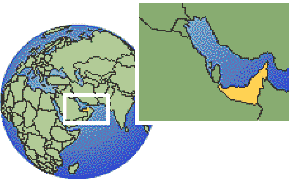The Geert Hofstede analysis for the
United Arab Emirates is almost identical to other Arab countries
their Muslim faith plays a large role in the people’s lives.
Large power distance and uncertainty avoidance are the predominant
characteristics for this region. This indicates that it is expected
and accepted that leaders separate themselves from the group
and issue complete and specific directives.
The
Geert Hofstede analysis for the Arab World, that
includes the countries of Egypt,
Iraq, Kuwait, Lebanon, Libya, Saudi Arabia, and the United
Arab Emirates, demonstrates the Muslim faith plays
a significant role
in the people’s lives.
Large Power Distance (PDI) (80) and Uncertainty Avoidance
(UAI) (68) are predominant Hofstede Dimension characteristics
for the countries in this region. These societies are
more likely to follow a caste system that does not
allow significant upward mobility of its citizens.
They are also highly rule-oriented with laws, rules,
regulations, and controls in order to reduce the amount
of uncertainty, while inequalities of power and wealth
have been allowed to grow within the society.
When
these two Dimensions are combined, it creates a situation
where leaders have virtually ultimate power
and authority, and the rules, laws and regulations
developed by those in power reinforce their own leadership
and control. It is not unusual for new leadership to
arise from armed insurrection – the ultimate
power, rather than from diplomatic or democratic change.
The high Power Distance (PDI) ranking is indicative
of a high level of inequality of power and wealth within
the society. These populations have an expectation
and acceptance that leaders will separate themselves
from the group and this condition is not necessarily
subverted upon the population, but rather accepted
by the society as their cultural heritage.
The
high Uncertainty Avoidance Index (UAI) ranking of
68, indicates the society’s
low level of tolerance for uncertainty. In an effort
to minimize
or reduce this level of uncertainty, strict rules,
laws, policies, and regulations are adopted and implemented.
The ultimate goal of these populations is to control
everything in order to eliminate or avoid the unexpected.
As a result of this high Uncertainty Avoidance characteristic,
the society does not readily accept change and is
very risk adverse.
The Masculinity index (MAS), the
third highest Hofstede Dimension is 52, only slightly
higher than the 50.2 average for all the countries
included in the Hofstede MAS Dimension. This would
indicate that while women in the Arab World are limited
in their rights, it may be due more to Muslim religion
rather than a cultural paradigm.
The lowest Hofstede Dimension for the Arab World is
the Individualism (IDV) ranking at 38, compared to
a world average ranking of 64. This translates into
a Collectivist society as compared to Individualist
culture and is manifested in a close long-term commitment
to the member 'group', that being a family, extended
family, or extended relationships. Loyalty in a collectivist
culture is paramount, and over-rides most other societal
rules.
The predominant religion for these countries is Islam,
the practice of the Muslim faith.
The combination of
these two high scores (UAI) and (PDI) create societies
that are highly rule-oriented with laws, rules, regulations,
and controls in order to reduce the amount of uncertainty,
while inequalities of power and wealth have been
allowed to grow within the society. These cultures
are more
likely to follow a caste system that does not allow
significant upward mobility of its citizens.
When
these two Dimensions are combined, it creates a situation
where leaders have virtually ultimate power
and authority, and the rules, laws and regulations
developed by those in power, reinforce their own leadership
and control. It is not unusual for new leadership to
arise from armed insurrection – the ultimate
power, rather than from diplomatic or democratic change. More Geert Hofstede Details
Written
by Stephen Taylor - the Sigma
Two Group



